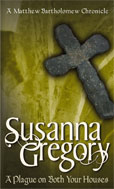
The First Chronicle of Matthew Bartholomew
In the tradition of Ellis Peters, A Plague on Both Your Houses introduces the physician Matthew Bartholomew.
Bartholomew’s unorthodox but effective treatment of his patients frequently draws accusations of heresy from his more traditional colleagues. Besides his practice, he is a teacher of medicine at Michaelhouse, part of the fledgling University of Cambridge.
In 1348, the inhabitants of Cambridge live under the shadow of a terrible pestilence that has ravaged Europe and is travelling relentlessly eastwards towards England. Bartholomew, however, is distracted by the sudden and inexplicable death of the Master of Michaelhouse – a death the University authorities do not want investigated. His pursuit of the truth leads him into a complex tangle of lies and intrigue that cause him to question the innocence of his closest friends – and even his family.
And then the Black Death finally arrives …
[buyingbuttons amazonpaperback=”http://www.amazon.co.uk/Plague-Both-Your-Houses-Bartholomew/dp/0751516953/ref=sr_1_1?s=books&ie=UTF8&qid=1341320833&sr=1-1″ amazonkindle=”http://www.amazon.co.uk/Plague-Both-Your-Houses-ebook/dp/B004EHZPQY/ref=sr_1_1_bnp_1_kin?s=books&ie=UTF8&qid=1341321531&sr=1-1″ waterstones=”http://www.waterstones.com/waterstonesweb/products/susanna+gregory/a+plague+on+both+your+houses/4110443/” amazonus=”http://www.amazon.com/Plague-Houses-Matthew-Bartholomew-Chronicles/dp/0751516953/ref=sr_1_1?s=books&ie=UTF8&qid=1341321181&sr=1-1&keywords=plague+on+both+your+houses” kindleus=”http://www.amazon.com/Plague-Both-Your-Houses-ebook/dp/B004EHZPQY/ref=sr_1_1_title_1_kin?s=books&ie=UTF8&qid=1341322659&sr=1-1&keywords=A+Plague+on+Both+Your+houses” ]
Extract
Cambridge 1348
The scholar waited in the black shadows of the churchyard trees for the Sheriff’s night patrol to pass by, trying to control his breathing. Two of the men stopped so close that he could have reached out and touched them. They stood for several minutes, leaning against the wall surrounding the churchyard, looking up and down the deserted road. The scholar held his breath until he thought he would choke. He could not be discovered now: there was so much to lose!
Eventually, the Sheriff’s men left, and the scholar took several unsteady breaths, forcing himself to remain in the safety of the shadows until he was certain that they had gone. He jumped violently, as a large cat stalked past his hiding place, glancing at him briefly with alert yellow eyes. He watched it sit for a moment in the middle of the road, before it disappeared up a dark alleyway.
The scholar gripped the voluminous folds of his cloak, so that he would not stumble on them, and slipped out of the trees into the road. The moon was almost full, and shed an eerie white light along the main street. He peered carefully both ways, and, satisfied that there was no one to see him, he made his way stealthily down the street towards his home.
The main gates of the College were locked, but the scholar had ensured that the little-used back door was left open. He turned from the road into St Michael’s Lane. He was almost there.
He froze in horror as he saw someone was already in the lane: another scholar, also disobeying College rules by being out at night, was walking towards him. Heart thumping, he ducked into a patch of tall nettles and weeds at the side of the road, in the hope that his stillness and dark cloak would keep him hidden. He heard the footsteps come closer and closer. Blood pounded in his ears, and he found he was trembling uncontrollably. The footsteps were almost level with him. Now he would be uncovered and dragged from his hiding place!
He almost cried in relief as the footfalls passed him by, and faded as his colleague turned the corner into the High Street. He stood shakily, oblivious to the stinging of the nettles on his bare skin, and ran to the back gate. Once inside, he barred it with shaking hands, and made his way to the kitchens. Faint with relief, he sank down next to the embers of the cooking fire and waited until his trembling had ceased. As he prepared to return to his room to sleep away what little remained of the night, he wondered how many more such trips he might make before he was seen.
Several hours later, the Bishop’s Mill miller dragged himself from his bed, tugged on his boots, and set off for work. The sky was beginning to turn from dark blue to silver in the east, and he shivered in the crispness of the early morning. He unlocked the door to the mill and then went to feed the fat pony that he kept to carry flour to the town.
A short distance away, he could hear the rhythmic whine and swish of the waterwheel, powered by a fast-running channel diverted from the river. The miller had grown so familiar with its sound, that he never noticed it unless there was something wrong. And there was something wrong this morning, as there was an additional thump in the rhythm.
The miller sighed irritably. Only the previous week he had had to ask his neighbours to help him free the branch of a tree that had entangled itself in the spokes, and he was loathe to impose on their good graces again. He tossed some oats to the pony, and, wiping his hands on his tunic, he went to investigate. As he drew nearer, he frowned in puzzlement. It did not sound like a branch had been caught, but something soggier and less rigid.
He felt his knees turn to jelly when he saw the wheel and what was caught in it, and sank onto the grass, unable to tear his eyes away. The body of a man was impaled there, black robes flapping wetly around him as the wheel dragged him under the water again and again. As it lifted the body, one arm flopped loose in a ghostly parody of a wave, which continued until the corpse dived feet first back into the water for another cycle. The horrified miller watched it salute him three times before he was able to scramble to his feet and race towards the town screaming for help.

